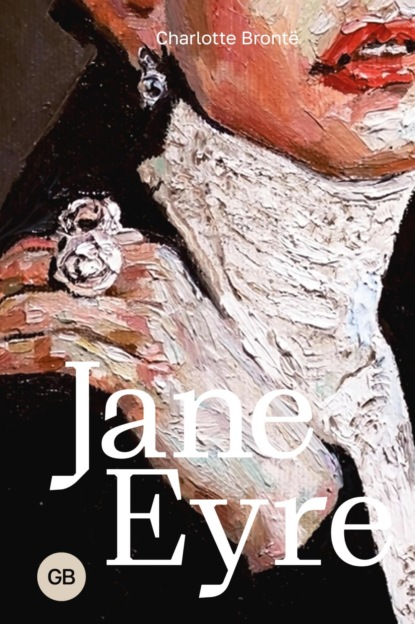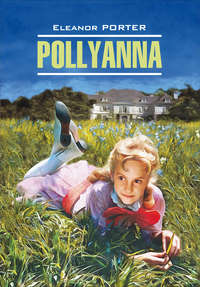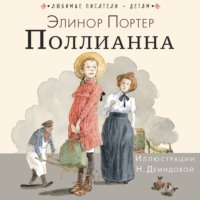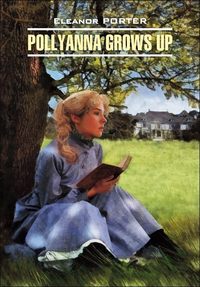
Полная версия
Pollyanna: The First Glad Book. Pollyanna Grows Up: The Second Glad Book / Поллианна. Поллианна вырастает
“PollyANNA!” remonstrated the lady, sternly, pulling herself as erect as she could with a dragging weight of ninety pounds hanging about her neck. “Is this the usual way you say good morning?”
The little girl dropped to her toes, and danced lightly up and down.
“No, only when I love folks so I just can’t help it! I saw you from my window, Aunt Polly, and I got to thinking how you WEREN’T a Ladies’ Aider, and you were my really truly aunt; and you looked so good I just had to come down and hug you!”
The bent old man turned his back suddenly. Miss Polly attempted a frown-with not her usual success.
“Pollyanna, you-I Thomas, that will do for this morning. I think you understand-about those rosebushes,” she said stiffly. Then she turned and walked rapidly away.
“Do you always work in the garden, Mr.-Man?” asked Pollyanna, interestedly.
The man turned. His lips were twitching, but his eyes looked blurred as if with tears.
“Yes, Miss. I’m Old Tom, the gardener,” he answered. Timidly, but as if impelled by an irresistible force, he reached out a shaking hand and let it rest for a moment on her bright hair. “You are so like your mother, little Miss! I used ter know her when she was even littler than you be. You see, I used ter work in the garden-then.”
Pollyanna caught her breath audibly.
“You did? And you knew my mother, really-when she was just a little earth angel, and not a Heaven one? Oh, please tell me about her!” And down plumped Pollyanna in the middle of the dirt path by the old man’s side.
A bell sounded from the house. The next moment Nancy was seen flying out the back door.
“Miss Pollyanna, that bell means breakfast-mornin’s,” she panted, pulling the little girl to her feet and hurrying her back to the house; “and other times it means other meals. But it always means that you’re ter run like time when ye hear it, no matter where ye be. If ye don’t-well, it’ll take somethin’ smarter’n we be ter find ANYTHIN’ ter be glad about in that!” she finished, shooing Pollyanna into the house as she would shoo an unruly chicken into a coop.
Breakfast, for the first five minutes, was a silent meal; then Miss Polly, her disapproving eyes following the airy wings of two flies darting here and there over the table, said sternly:
“Nancy, where did those flies come from?”
“I don’t know, ma’am. There wasn’t one in the kitchen.” Nancy had been too excited to notice Pollyanna’s up-flung windows the afternoon before.
“I reckon maybe they’re my flies, Aunt Polly,” observed Pollyanna, amiably. “There were lots of them this morning having a beautiful time upstairs.”
Nancy left the room precipitately, though to do so she had to carry out the hot muffins she had just brought in.
“Yours!” gasped Miss Polly. “What do you mean? Where did they come from?”
“Why, Aunt Polly, they came from out of doors of course, through the windows. I SAW some of them come in.”
“You saw them! You mean you raised those windows without any screens?”
“Why, yes. There weren’t any screens there, Aunt Polly.”
Nancy, at this moment, came in again with the muffins. Her face was grave, but very red.
“Nancy,” directed her mistress, sharply, “you may set the muffins down and go at once to Miss Pollyanna’s room and shut the windows. Shut the doors, also. Later, when your morning work is done, go through every room with the spatter. See that you make a thorough search.”
To her niece she said:
“Pollyanna, I have ordered screens for those windows. I knew, of course, that it was my duty to do that. But it seems to me that you have quite forgotten YOUR duty.”
“My-duty?” Pollyanna’s eyes were wide with wonder.
“Certainly. I know it is warm, but I consider it your duty to keep your windows closed till those screens come. Flies, Pollyanna, are not only unclean and annoying, but very dangerous to health. After breakfast I will give you a little pamphlet on this matter to read.”
“To read? Oh, thank you, Aunt Polly. I love to read!”
Miss Polly drew in her breath audibly, then she shut her lips together hard. Pollyanna, seeing her stern face, frowned a little thoughtfully.
“Of course I’m sorry about the duty I forgot, Aunt Polly,” she apologized timidly. “I won’t raise the windows again.”
Her aunt made no reply. She did not speak, indeed, until the meal was over. Then she rose, went to the bookcase in the sitting room, took out a small paper booklet, and crossed the room to her niece’s side.
“This is the article I spoke of, Pollyanna. I desire you to go to your room at once and read it. I will be up in half an hour to look over your things.”
Pollyanna, her eyes on the illustration of a fly’s head, many times magnified, cried joyously:
“Oh, thank you, Aunt Polly!” The next moment she skipped merrily from the room, banging the door behind her.
Miss Polly frowned, hesitated, then crossed the room majestically and opened the door; but Pollyanna was already out of sight, clattering up the attic stairs.
Half an hour later when Miss Polly, her face expressing stern duty in every line, climbed those stairs and entered Pollyanna’s room, she was greeted with a burst of eager enthusiasm.
“Oh, Aunt Polly, I never saw anything so perfectly lovely and interesting in my life. I’m so glad you gave me that book to read! Why, I didn’t suppose flies could carry such a lot of things on their feet, and-”
“That will do,” observed Aunt Polly, with dignity. “Pollyanna, you may bring out your clothes now, and I will look them over. What are not suitable for you I shall give to the Sullivans, of course.”
With visible reluctance Pollyanna laid down the pamphlet and turned toward the closet.
“I’m afraid you’ll think they’re worse than the Ladies’ Aid did-and THEY said they were shameful,” she sighed. “But there were mostly things for boys and older folks in the last two or three barrels; and-did you ever have a missionary barrel, Aunt Polly?”
At her aunt’s look of shocked anger, Pollyanna corrected herself at once.
“Why, no, of course you didn’t, Aunt Polly!” she hurried on, with a hot blush. “I forgot; rich folks never have to have them. But you see sometimes I kind of forget that you are rich-up here in this room, you know.”
Miss Polly’s lips parted indignantly, but no words came. Pollyanna, plainly unaware that she had said anything in the least unpleasant, was hurrying on.
“Well, as I was going to say, you can’t tell a thing about missionary barrels-except that you won’t find in ‘em what you think you’re going to-even when you think you won’t. It was the barrels every time, too, that were hardest to play the game on, for father and-”
Just in time Pollyanna remembered that she was not to talk of her father to her aunt. She dived into her closet then, hurriedly, and brought out all the poor little dresses in both her arms.
“They aren’t nice, at all,” she choked, “and they’d been black if it hadn’t been for the red carpet for the church; but they’re all I’ve got.”
With the tips of her fingers Miss Polly turned over the conglomerate garments, so obviously made for anybody but Pollyanna. Next she bestowed frowning attention on the patched undergarments in the bureau drawers.
“I’ve got the best ones on,” confessed Pollyanna, anxiously. “The Ladies’ Aid bought me one set straight through all whole. Mrs. Jones-she’s the president-told ‘em I should have that if they had to clatter down bare aisles themselves the rest of their days. But they won’t. Mr. White doesn’t like the noise. He’s got nerves, his wife says; but he’s got money, too, and they expect he’ll give a lot toward the carpet-on account of the nerves, you know. I should think he’d be glad that if he did have the nerves he’d got money, too; shouldn’t you?”
Miss Polly did not seem to hear. Her scrutiny of the undergarments finished, she turned to Pollyanna somewhat abruptly.
“You have been to school, of course, Pollyanna?”
“Oh, yes, Aunt Polly. Besides, fath-I mean, I was taught at home some, too.”
Miss Polly frowned.
“Very good. In the fall you will enter school here, of course. Mr. Hall, the principal, will doubtless settle in which grade you belong. Meanwhile, I suppose I ought to hear you read aloud half an hour each day.”
“I love to read; but if you don’t want to hear me I’d be just glad to read to myself-truly, Aunt Polly. And I wouldn’t have to half try to be glad, either, for I like best to read to myself-on account of the big words, you know.”
“I don’t doubt it,” rejoined Miss Polly, grimly. “Have you studied music?”
“Not much. I don’t like my music-I like other people’s, though. I learned to play on the piano a little. Miss Gray-she plays for church-she taught me. But I’d just as soon let that go as not, Aunt Polly. I’d rather, truly.”
“Very likely,” observed Aunt Polly, with slightly uplifted eyebrows. “Nevertheless I think it is my duty to see that you are properly instructed in at least the rudiments of music. You sew, of course.”
“Yes, ma’am.” Pollyanna sighed. “The Ladies’ Aid taught me that. But I had an awful time. Mrs. Jones didn’t believe in holding your needle like the rest of ‘em did on buttonholing, and Mrs. White thought backstitching ought to be taught you before hemming (or else the other way), and Mrs. Harriman didn’t believe in putting you on patchwork ever, at all.”
“Well, there will be no difficulty of that kind any longer, Pollyanna. I shall teach you sewing myself, of course. You do not know how to cook, I presume.”
Pollyanna laughed suddenly.
“They were just beginning to teach me that this summer, but I hadn’t got far. They were more divided up on that than they were on the sewing. They were GOING to begin on bread; but there wasn’t two of ‘em that made it alike, so after arguing it all one sewing-meeting, they decided to take turns at me one forenoon a week-in their own kitchens, you know. I’d only learned chocolate fudge and fig cake, though, when-when I had to stop.” Her voice broke.
“Chocolate fudge and fig cake, indeed!” scorned Miss Polly. “I think we can remedy that very soon.” She paused in thought for a minute, then went on slowly: “At nine o’clock every morning you will read aloud one half-hour to me. Before that you will use the time to put this room in order. Wednesday and Saturday forenoons, after half-past nine, you will spend with Nancy in the kitchen, learning to cook. Other mornings you will sew with me. That will leave the afternoons for your music. I shall, of course, procure a teacher at once for you,” she finished decisively, as she arose from her chair.
Pollyanna cried out in dismay.
“Oh, but Aunt Polly, Aunt Polly, you haven’t left me any time at all just to-to live.”
“To live, child! What do you mean? As if you weren’t living all the time!”
“Oh, of course I’d be BREATHING all the time I was doing those things, Aunt Polly, but I wouldn’t be living. You breathe all the time you’re asleep, but you aren’t living. I mean living-doing the things you want to do: playing outdoors, reading (to myself, of course), climbing hills, talking to Mr. Tom in the garden, and Nancy, and finding out all about the houses and the people and everything everywhere all through the perfectly lovely streets I came through yesterday. That’s what I call living, Aunt Polly. Just breathing isn’t living!”
Miss Polly lifted her head irritably.
“Pollyanna, you ARE the most extraordinary child! You will be allowed a proper amount of playtime, of course. But, surely, it seems to me if I am willing to do my duty in seeing that you have proper care and instruction, YOU ought to be willing to do yours by seeing that that care and instruction are not ungratefully wasted.”
Pollyanna looked shocked.
“Oh, Aunt Polly, as if I ever could be ungrateful-to YOU! Why, I LOVE YOU-and you aren’t even a Ladies’ Aider; you’re an aunt!”
“Very well; then see that you don’t act ungrateful,” vouchsafed Miss Polly, as she turned toward the door.
She had gone halfway down the stairs when a small, unsteady voice called after her:
“Please, Aunt Polly, you didn’t tell me which of my things you wanted to-to give away.”
Aunt Polly emitted a tired sigh-a sigh that ascended straight to Pollyanna’s ears.
“Oh, I forgot to tell you, Pollyanna. Timothy will drive us into town at half-past one this afternoon. Not one of your garments is fit for my niece to wear. Certainly I should be very far from doing my duty by you if I should let you appear out in any one of them.”
Pollyanna sighed now-she believed she was going to hate that word-duty.
“Aunt Polly, please,” she called wistfully, “isn’t there ANY way you can be glad about all that-duty business?”
“What?” Miss Polly looked up in dazed surprise; then, suddenly, with very red cheeks, she turned and swept angrily down the stairs. “Don’t be impertinent, Pollyanna!”
In the hot little attic room Pollyanna dropped herself on to one of the straight-backed chairs. To her, existence loomed ahead one endless round of duty.
“I don’t see, really, what there was impertinent about that,” she sighed. “I was only asking her if she couldn’t tell me something to be glad about in all that duty business.”
For several minutes Pollyanna sat in silence, her rueful eyes fixed on the forlorn heap of garments on the bed. Then, slowly, she rose and began to put away the dresses.
“There just isn’t anything to be glad about, that I can see,” she said aloud; “unless-it’s to be glad when the duty’s done!” Whereupon she laughed suddenly.
Chapter VII
Pollyanna and punishments
At half-past one o’clock Timothy drove Miss Polly and her niece to the four or five principal dry goods stores, which were about half a mile from the homestead.
Fitting Pollyanna with a new wardrobe proved to be more or less of an exciting experience for all concerned. Miss Polly came out of it with the feeling of limp relaxation that one might have at finding oneself at last on solid earth after a perilous walk across the very thin crust of a volcano. The various clerks who had waited upon the pair came out of it with very red faces, and enough amusing stories of Pollyanna to keep their friends in gales of laughter the rest of the week. Pollyanna herself came out of it with radiant smiles and a heart content; for, as she expressed it to one of the clerks: “When you haven’t had anybody but missionary barrels and Ladies’ Aiders to dress you, it IS perfectly lovely to just walk right in and buy clothes that are brand-new, and that don’t have to be tucked up or let down because they don’t fit!”
The shopping expedition consumed the entire afternoon; then came supper and a delightful talk with Old Tom in the garden, and another with Nancy on the back porch, after the dishes were done, and while Aunt Polly paid a visit to a neighbor.
Old Tom told Pollyanna wonderful things of her mother, that made her very happy indeed; and Nancy told her all about the little farm six miles away at “The Corners,” where lived her own dear mother, and her equally dear brother and sisters. She promised, too, that sometime, if Miss Polly were willing, Pollyanna should be taken to see them.
“And THEY’VE got lovely names, too. You’ll like THEIR names,” sighed Nancy. “They’re ‘Algernon,’ and ‘Florabelle’ and ‘Estelle.’ I–I just hate ‘Nancy’!”
“Oh, Nancy, what a dreadful thing to say! Why?”
“Because it isn’t pretty like the others. You see, I was the first baby, and mother hadn’t begun ter read so many stories with the pretty names in ‘em, then.”
“But I love ‘Nancy,’ just because it’s you,” declared Pollyanna.
“Humph! Well, I guess you could love ‘Clarissa Mabelle’ just as well,” retorted Nancy, “and it would be a heap happier for me. I think THAT name’s just grand!”
Pollyanna laughed.
“Well, anyhow,” she chuckled, “you can be glad it isn’t ‘Hephzibah.’”
“Hephzibah!”
“Yes. Mrs. White’s name is that. Her husband calls her ‘Hep,’ and she doesn’t like it. She says when he calls out ‘Hep-Hep!’ she feels just as if the next minute he was going to yell ‘Hurrah!’ And she doesn’t like to be hurrahed at.”
Nancy’s gloomy face relaxed into a broad smile.
“Well, if you don’t beat the Dutch! Say, do you know? – I sha’n’t never hear ‘Nancy’ now that I don’t think o’ that ‘Hep-Hep!’ and giggle. My, I guess I AM glad-” She stopped short and turned amazed eyes on the little girl. “Say, Miss Pollyanna, do you mean-was you playin’ that ‘ere game THEN-about my bein’ glad I wa’n’t named Hephzibah’?”
Pollyanna frowned; then she laughed.
“Why, Nancy, that’s so! I WAS playing the game-but that’s one of the times I just did it without thinking, I reckon. You see, you DO, lots of times; you get so used to it-looking for something to be glad about, you know. And most generally there is something about everything that you can be glad about, if you keep hunting long enough to find it.”
“Well, m-maybe,” granted Nancy, with open doubt.
At half-past eight Pollyanna went up to bed. The screens had not yet come, and the close little room was like an oven. With longing eyes Pollyanna looked at the two fast-closed windows-but she did not raise them. She undressed, folded her clothes neatly, said her prayers, blew out her candle and climbed into bed.
Just how long she lay in sleepless misery, tossing from side to side of the hot little cot, she did not know; but it seemed to her that it must have been hours before she finally slipped out of bed, felt her way across the room and opened her door.
Out in the main attic all was velvet blackness save where the moon flung a path of silver halfway across the floor from the east dormer window. With a resolute ignoring of that fearsome darkness to the right and to the left, Pollyanna drew a quick breath and pattered straight into that silvery path, and on to the window.
She had hoped, vaguely, that this window might have a screen, but it did not. Outside, however, there was a wide world of fairylike beauty, and there was, too, she knew, fresh, sweet air that would feel so good to hot cheeks and hands!
As she stepped nearer and peered longingly out, she saw something else: she saw, only a little way below the window, the wide, flat tin roof of Miss Polly’s sun parlor built over the porte-cochere. The sight filled her with longing. If only, now, she were out there!
Fearfully she looked behind her. Back there, somewhere, were her hot little room and her still hotter bed; but between her and them lay a horrid desert of blackness across which one must feel one’s way with outstretched, shrinking arms; while before her, out on the sun-parlor roof, were the moonlight and the cool, sweet night air.
If only her bed were out there! And folks did sleep out of doors. Joel Hartley at home, who was so sick with the consumption, HAD to sleep out of doors.
Suddenly Pollyanna remembered that she had seen near this attic window a row of long white bags hanging from nails. Nancy had said that they contained the winter clothing, put away for the summer. A little fearfully now, Pollyanna felt her way to these bags, selected a nice fat soft one (it contained Miss Polly’s sealskin coat) for a bed; and a thinner one to be doubled up for a pillow, and still another (which was so thin it seemed almost empty) for a covering. Thus equipped, Pollyanna in high glee pattered to the moonlit window again, raised the sash, stuffed her burden through to the roof below, then let herself down after it, closing the window carefully behind her-Pollyanna had not forgotten those flies with the marvellous feet that carried things.
How deliciously cool it was! Pollyanna quite danced up and down with delight, drawing in long, full breaths of the refreshing air. The tin roof under her feet crackled with little resounding snaps that Pollyanna rather liked. She walked, indeed, two or three times back and forth from end to end-it gave her such a pleasant sensation of airy space after her hot little room; and the roof was so broad and flat that she had no fear of falling off. Finally, with a sigh of content, she curled herself up on the sealskin-coat mattress, arranged one bag for a pillow and the other for a covering, and settled herself to sleep.
“I’m so glad now that the screens didn’t come,” she murmured, blinking up at the stars; “else I couldn’t have had this!”
Downstairs in Miss Polly’s room next the sun parlor, Miss Polly herself was hurrying into dressing gown and slippers, her face white and frightened. A minute before she had been telephoning in a shaking voice to Timothy:
“Come up quick! – you and your father. Bring lanterns. Somebody is on the roof of the sun parlor. He must have climbed up the rose-trellis or somewhere, and of course he can get right into the house through the east window in the attic. I have locked the attic door down here-but hurry, quick!”
Some time later, Pollyanna, just dropping off to sleep, was startled by a lantern flash, and a trio of amazed ejaculations. She opened her eyes to find Timothy at the top of a ladder near her, Old Tom just getting through the window, and her aunt peering out at her from behind him.
“Pollyanna, what does this mean?” cried Aunt Polly then.
Pollyanna blinked sleepy eyes and sat up.
“Why, Mr. Tom-Aunt Polly!” she stammered. “Don’t look so scared! It isn’t that I’ve got the consumption, you know, like Joel Hartley. It’s only that I was so hot-in there. But I shut the window, Aunt Polly, so the flies couldn’t carry those germ-things in.”
Timothy disappeared suddenly down the ladder. Old Tom, with almost equal precipitation, handed his lantern to Miss Polly, and followed his son. Miss Polly bit her lip hard-until the men were gone; then she said sternly:
“Pollyanna, hand those things to me at once and come in here. Of all the extraordinary children!” she ejaculated a little later, as, with Pollyanna by her side, and the lantern in her hand, she turned back into the attic.
To Pollyanna the air was all the more stifling after that cool breath of the out of doors; but she did not complain. She only drew a long quivering sigh.
At the top of the stairs Miss Polly jerked out crisply:
“For the rest of the night, Pollyanna, you are to sleep in my bed with me. The screens will be here tomorrow, but until then I consider it my duty to keep you where I know where you are.”
Pollyanna drew in her breath.
“With you? – in your bed?” she cried rapturously. “Oh, Aunt Polly, Aunt Polly, how perfectly lovely of you! And when I’ve so wanted to sleep with someone sometime-someone that belonged to me, you know; not a Ladies’ Aider. I’ve HAD them. My! I reckon I am glad now those screens didn’t come! Wouldn’t you be?”
There was no reply. Miss Polly was stalking on ahead. Miss Polly, to tell the truth, was feeling curiously helpless. For the third time since Pollyanna’s arrival, Miss Polly was punishing Pollyanna-and for the third time she was being confronted with the amazing fact that her punishment was being taken as a special reward of merit. No wonder Miss Polly was feeling curiously helpless.
Chapter VIII
Pollyanna Pays a Visit
It was not long before life at the Harrington homestead settled into something like order-though not exactly the order that Miss Polly had at first prescribed. Pollyanna sewed, practised, read aloud, and studied cooking in the kitchen, it is true; but she did not give to any of these things quite so much time as had first been planned. She had more time, also, to “just live,” as she expressed it, for almost all of every afternoon from two until six o’clock was hers to do with as she liked-provided she did not “like” to do certain things already prohibited by Aunt Polly.
It is a question, perhaps, whether all this leisure time was given to the child as a relief to Pollyanna from work-or as a relief to Aunt Polly from Pollyanna. Certainly, as those first July days passed, Miss Polly found occasion many times to ejaculate “What an extraordinary child!” and certainly the reading and sewing lessons found her at their conclusion each day somewhat dazed and wholly exhausted.
Nancy, in the kitchen, fared better. She was not dazed nor exhausted. Wednesdays and Saturdays came to be, indeed, red-letter days to her.
There were no children in the immediate neighborhood of the Harrington homestead for Pollyanna to play with. The house itself was on the outskirts of the village, and though there were other houses not far away, they did not chance to contain any boys or girls near Pollyanna’s age. This, however, did not seem to disturb Pollyanna in the least.














